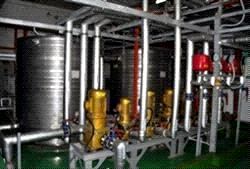Consumables
Singapore Epson Industrial Develops Original Environmental Technologies

Tuesday 14. May 2013 - In addition to its semiconductor plant, Singapore Epson Industrial Pte Ltd. is an Epson Group company that specializes in metal plating and other types of surface processing.
Many people associate such plants – with their large-scale use of chemicals, water and energy – with a significant impact on the environment. Singapore Epson Industrial, however, has applied the expertise it has accumulated over the years to significantly reduce the environmental burden and also the cost of its operations.
Dr. Fang Shunong, responsible for Epson’s surface processing business, explains, “We incur significant expenses purchasing the heavy metals and chemicals used in surface processing and it also costs a lot to dispose of them. My aim is to recycle these materials so we can reduce the environmental burden, and also make our operations as efficient as possible.”
Recycling waste water
The surface processing plant uses approximately 400 tons of water every day. This water contains a number of substances that need to be treated before the water is disposed of. Previously this meant using deposition techniques to remove the substances from the water. Unfortunately the agents used in the deposition process remained in the water, and made it impossible to reuse.
Singapore Epson Industrial therefore created an original system that uses a fine filter to expertly separate the substances from the water and ensure that the water can be reused.
Effects
Around 25 tons of water can be reused every hour (almost no water is disposed of)
Other waste has been reduced by 90%
The space occupied by processing equipment has been reduced from 45 m2 to 7 m2
(a large deposition tank is no longer necessary)
Large savings on purchasing and disposing of deposition agents
Achieved 86% water savings
Reusing nickel
When surface processing with electroless nickel, it used to be necessary to change the plating liquid contained in two tanks of 1,000 and 400 kiloliters every day. It was not easy to dispose of this liquid because it contains complexing agents that make deposition difficult. However, Singapore Epson Industrial developed an original and completely automatic system that applies electrochemistry to separate the nickel from the complexing agent, and enables the company to reuse the nickel.
Effects
Makes it possible to process liquid that could not previously be processed
Reduced waste nickel (almost all nickel can be used as plating material)
Reduced cost of purchasing and disposing of nickel
Reduced chemicals and labor used for deposition process
Reduced electricity consumption
The chemicals used in surface processing must all be individually temperature controlled. This used to mean using an electric heater to heat water to the various required temperatures. However, this involved using large amounts of electricity and required replacing the electric heaters once a year. All of this was very expensive. It was also dangerous to use electricity close to some of the chemicals, which are inflammable.
Singapore Epson Industrial therefore hit upon the idea of using solar panels and heat pumps instead of electric heaters. The system also used the cold air generated by the pumps in air conditioning with the result that the company greatly reduced electricity use and also improved plant safety.
Effects
Electricity consumption reduced by 20% (investment recovered in approximately one year)
No need for electric heaters that have to be replaced every year.
Singapore Epson Industrial has also developed a number of other environmental technologies that it is applying within the plant.
System for reusing hydrochloric acid
Effects
Semi-permanent recycling of hydrochloric acid.
Significantly reduced waste (approx. 100 tons per year to 12 tons)
Significantly reduced chemical use (approx. 83 tons per year to 10 tons)
Significantly reduced water use (approx. 83 tons per year to 10 tons)
Dehumidifying dryer
Effects
Electricity use declined by 45%
Prevented discoloring of plastic parts.
Can dry items without removing from machinery. Possible to process online.
Reduced drying time (25% reduction)
System for reusing potassium permanganate
Effects
Can be continuously reused
Reduced waste chemicals by 95%
Reduced chemical use by 90%
Reduced cost of installing machinery by 92%
In May 2013, Epson Surface Engineering (Zhenjiang) Co. Ltd., a new surface processing plant using technology developed by Singapore Epson Industrial, began accepting orders. Singapore Epson Industrial plans to continue developing environmental technologies, and to promote their use throughout the Epson Group.
